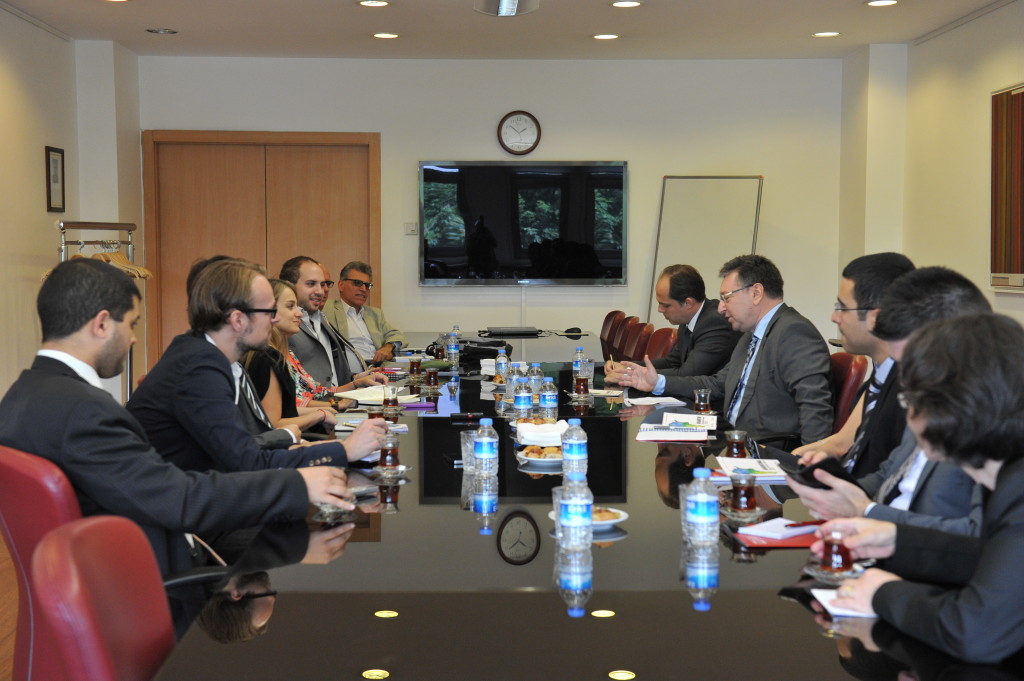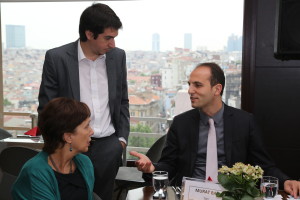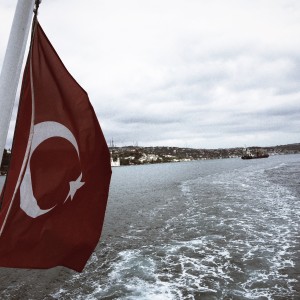
Representatives from the Turkish Foreign Ministry meet with journalists at a meeting in Ankara last week.
World Trade special
Government officials say their country is keen to develop ties, but that Argentine lawmakers’ rulings in Congress are ‘poisoning relations’
ANKARA — Recent and repeated resolutions by Argentine lawmakers in the National Congress this year, on the centenary of what Armenians call an act of “genocide,” are hurting the South American country’s ability to develop and improve its bilateral trade relations with Turkey, officials in Ankara declared late last month.
Complaining against the more than 20 legislative declarations passed by Argentine lawmakers, Turkish officials argued that the strength of the “Armenian diaspora” in Argentina is hurting the relationship between the nations.
Addressing the Armenian issue the Turkish ambassador and Director General for the Americas Ali Kaya Savut said at a meeting with Argentine journalists:
“These events happened in 1915 at the end of the Ottoman Empire. It’s true that atrocities and many tragic events happened… we don’t deny this.”
“But what we don’t accept is that we can qualify this as genocide. It was not premeditated,” he added. “There were fights on both sides.”
Argentina is one of approximately 30 countries in the world which recognizes the tragic events of 1915 as an act of genocide. The “Armenian issue,” as another Turkish official called it, hangs heavily over relations between Argentina and Turkey.
“In Argentina, the Armenian diaspora is very powerful, economically and also (in terms of) numbers in the population,” said Savut.
“In Argentina, you passed a law which declared that April 24 was a day of respect for the Armenians and they can take this day off (work) legally.
“Until this year, more than 20 resolutions were passed in the Argentine Congress. This year, seven or eight (further) resolutions and other declarations were passed in the Senate and the Congress,” he added. “Thirteen others were also adopted by the local governments.
“I think that it’s a pity. First of all, it’s not the job of the parliaments to decide what happened 100 years ago… they (lawmakers) are not historians, they cannot be objective… they think about the votes and the next elections, not what happened 100 years ago.
“Secondly, it poisons our bilateral relations. Our trade volume is lower than others and (diplomatic) visits are not at the level we would like,” Savut added.
“We cannot reach the true potential of our bilateral relations because of this issue, which is not a bilateral issue — it has nothing to do with Turkish-Argentine relations but unfortunately, it has a negative effect on our relations. It makes it harder to normalize relations with Armenia too.”
An example of the strength of feeling over the Turkish-Armenian ‘controversy,‘ as it’s called in a new Turkish book, is evidenced by one diplomatic fallout five years ago.
In 2010, then-Turkish prime minister Tayyip Recep Erdogan cancelled a trip to Argentina, during which he was to unveil a bust of Turkey’s founding father Mustafa Kemal Atatürk at the Jorge Newbery park. Pressure from the “Armenian diaspora” led to the trip’s cancellation, Turkish officials said, after permission for the bust was revoked.
There have been attempts to build bridges since then however. President Cristina Fernández de Kirchner visited Turkey in 2011 and earlier this year, in January, Foreign Minister Héctor Timerman visited Ankara, meeting with Turkish diplomats and ambassadors, but trade has still failed to soar higher.
‘It poisons our bilateral relations. Our trade volume is lower than others and (diplomatic) visits are not at the level we would like.’
Latin American ties
In the Ottoman Empire, officials referred to Argentina in their mother tongue as “silver land,” and Argentina and Turkey have had a long diplomatic relationship, with embassies in each other first being established in 1938.
But with trade between the two countries now at such a low level, both sides seem eager to improve their relationships. Turkey is also keen on pushing deeper into Latin America as a whole.
“In the last century, we opened six embassies, in the main (Latin American) capitals,” said Savut, before conceding that trade between Argentina and Turkey has been “limited” in recent years.
Turkey has strong ties with the Organization of American States, the Pacific Alliance and “some dialogue” with the Mercosur trade bloc, the ambassador observed. In 2006, Turkey made a conscious effort to push into Latin America and the Caribbean, he added, opening new embassies in Colombia, Ecuador and Central America, bringing the regional number to 12.
But while relations and trade with Brazil, Mexico, Chile and Colombia have improved — in the last 10 years, Turkish trade with the region rose ninefold, reaching US$8 billion — contacts with Buenos Aires have been few and far between.
In truth, total trade between the two nations currently rakes up less than half a billion US dollars. This ranks far behind Turkey’s main regional partners — Brazil, Mexico and Colombia.
“(The figure) does not represent what we can do,” said Savut.
“It’s much less than the potential we have, since we are both G20 countries… we still have much less trade volume than with Brazil, with Mexico, with Colombia, with Chile… it’s a pity, we should increase this,” he added.
“We hope this will increase.”
Ankara Foreign Ministry officials were keen to emphasize that some Turkish companies (textiles, PVC producers) are operating in Argentina, as well as the strength of Istanbul’s textile-exporting powerhouse companies and the success of Turkish Airlines which has signed up national soccer team captain Lionel Messi as a brand ambassador.
Potential for growth
The Turkish authorities are keen to stress their desire to develop closer trade links with Argentina and Latin America as a whole. The government instigated an outreach programme to Latin America and the Caribbean in 2006, establishing and improving and opening new embassies to help with the demand.

Murat Bas, senior vice-president of Marketing and Sales at Turkish airlines, talks with Argentine journalists at a meeting in Istanbul last week.
One of the key companies involved is Turkish Airlines, the worldwide carrier company now running flights to Buenos Aires (with a stop in Sao Paulo).
The company hopes, in the near future, to expand in the region with new routes taking in Bogotá and Mexico City.
It has also made somewhat tentative eyes at Havana, although officials from the airline indicated that dealing with Cuba was difficult and the route was unlikely to come off.
Turkey’s Erdogan visited Havana back in February, earlier this year, where, Turkish officials said, he had “a long chat with Raúl (Castro)” and proposed his government build a mosque in the Cuban capital.
The Turkish government has also sought to make inroads on the continent via TIKA, otherwise known as the Turkish Cooperation and Coordination Agency.
Dr Rahman Nurden, the agency’s chief departmental head for Latin America, says that their work has focused on “underdeveloped, below middle-income countries,” especially in Central America and the Caribbean.
He says TIKA — a body funded by the government’s foreign aid budget and private partnerships — “is an instrument for countries to get to know each other with a ‘mandate to reach out to the wider world” and was keen to highlight the agency’s new offices in Mexico and (imminently) Colombia.
“The Latin America region has been neglected by Turkey for many years,” Dr Nurden said, adding that he hoped this would change in the years to come.
The economy and the election
Turkey’s economy is now in the hands of the new government, which will take office soon following yesterday’s election. This article was written prior to the vote, but in the final week of campaigning, some data emerged indicating voters’ concerns over a weakening economy, which has — for the last decade, generally — been a plus for the governing Justice and Development Party (AKP), still led by Erdogan, who is now Turkey’s president.
The economy, worth an estimated US$850 billion according to most market estimates, is now a worry, with unemployment — now at a five-year high of 11 percent — concerning voters the most.
One survey quoted by the Wall Street Journal last week, even concluded that 57 percent of voters disapproved of the government’s handling of the economy, with a record-low 34 percent approval. The poll, carried out by the Metropoll Strategic and Social Research Centre, indicated that stagnating growth figures, worsening investor confidence and concerns over the centralization of power were responsible for the findings.
The AKP however remains an electoral powerhouse, winning six consecutive elections over the last 13 years and despite the unrest emanating from some sections, remains on track to take a substantial share of the vote, it seemed on Friday.
Speaking to Argentine journalists in Ankara, officials from the government indicated they feel key EU members are blocking the path to the eurozone.
European Union ambitions?
One of the burning questions for the Turkish government concerns its hopes to become a member of the European Union (EU), which have seemingly stalled in recent years.
Speaking to Argentine journalists in Ankara, officials from the government indicated they feel key EU members are blocking the path to the eurozone.
“Some countries are against Turkey joining the EU,” said one official, who suggested that Turkey’s huge 74-million-strong population scared the bloc’s members. “(We are) too big. We would have a big say if we join… it could change the balance of power.”
The sheer number of Turks would indeed alter the EU, as Turkey would secure a huge number of seats in the European Parliament. Should its bid be approved, the country would become the second-largest nation in the eurozone, after Germany.
Some citizens and officials suggested, on a personal level, that they felt the predominantly “Christian, Westernized” EU feared the introduction of millions of Muslims into the block, especially with immigration a hot topic on the continent of late.
The outcome of yesterday’s election will of course set Turkey’s path for the immediate future and with economic problems seemingly a growing concern on voters’ minds, looking further afield may perhaps take a back seat for the new government as domestic priorities come to the fore. Nonetheless, the current administration remains keen on expanding its influence in Latin America and the Caribbean.
Editor’s note: The author visited Turkey alongside seven other journalists, as part of an invitation to Argentine journalists from the Turkish goernment.
@URLgoeshere
Originally published in the Buenos Aires Herald, on Monday, June 8, 2015
as the lead story of the World Trade supplement.

